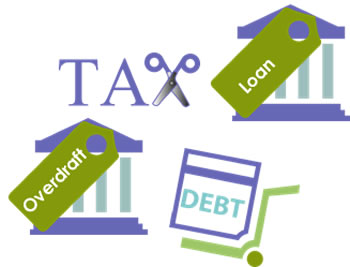Difference between Liability and Debt
Key Difference: Debt is every similar to liabilities. Both refer to obligations in which money needs to be paid back. In most instances, debt includes all liabilities, especially when calculating debt-to-equity ratio. However, in certain cases, debt may only include short-term and long-term loans and bonds payable, and might exclude accrued wages and utilities, income taxes payable, and other liabilities.
 In most general terms, liability and debt mean the same thing. Both the terms refer to something a person owes. In order to truly understand what liability and debt mean, one has to take into account liabilities and assets.
In most general terms, liability and debt mean the same thing. Both the terms refer to something a person owes. In order to truly understand what liability and debt mean, one has to take into account liabilities and assets.
An asset is anything on which money can be earned, whereas a liability is anything on which money needs to be paid, either immediately or in the long run. For example, cash, inventory, accounts receivable, land, buildings, equipment, etc. are all things that count as assets. Whereas cash payable, services owed, loans, etc. are all counted as liabilities.
Now, a debt is every similar to liabilities. Both refer to obligations in which money needs to be paid back. However, it should be noted, that while both can be used interchangeably in nearly all situations, there is a slight difference between the two terms. In most instances, debt includes all liabilities, especially when calculating debt-to-equity ratio. However, in certain cases, debt may only include short-term and long-term loans and bonds payable, and might exclude accrued wages and utilities, income taxes payable, and other liabilities. Whereas, the term liabilities usually includes all of these.
 Another point to be noted is that while both the terms may be used in context of a business or a company, the term liability is usually not used for an individual. Here, the term debt is most commonly used, though it could be replaced with liabilities, it usually is not the norm.
Another point to be noted is that while both the terms may be used in context of a business or a company, the term liability is usually not used for an individual. Here, the term debt is most commonly used, though it could be replaced with liabilities, it usually is not the norm.
Comparison between Liability and Debt:
|
|
Liability |
Debt |
|
Definition (Oxford Dictionaries) |
A thing for which someone is responsible, especially an amount of money owed. |
A sum of money that is owed or due. |
|
Description |
Anything that takes money out of the pocket |
Money that needs to be paid |
|
Examples |
Cash payable, services owed, loans, etc. |
Cash payable, payments owed, loans, etc. |
|
Includes |
Short-term and long-term loans and bonds payable, accrued wages and utilities, income taxes payable, and other liabilities |
In certain cases, debt may only include short-term and long-term loans and bonds payable, and might exclude accrued wages and utilities, income taxes payable, and other liabilities. |
Reference: Oxford Dictionaries (Liability and Debt), Investopedia, Accounting Coach Image Courtesy: quizizz.com, usnews.com









Add new comment